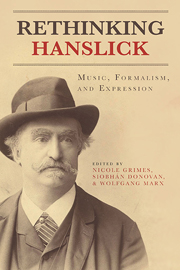Book contents
- Frontmatter
- Contents
- Foreword by Mark Evan Bonds
- Acknowledgments
- Abbreviations
- Chronology
- Introduction
- Part One Rules of Engagement
- Part Two Liberalism and Societal Order
- 5 Hanslick on Johann Strauss Jr.: Genre, Social Class, and Liberalism in Vienna
- 6 Waltzing around the Musically Beautiful: Listening and Dancing in Hanslick's Hierarchy of Musical Perception
- 7 “Poison-Flaming Flowers from the Orient and Nightingales from Bayreuth”: On Hanslick's Reception of the Music of Goldmark
- 8 German Humanism, Liberalism, and Elegy in Hanslick's Writings on Brahms
- Part Three Memoirs and Meaning in Social Contexts
- Part Four Critical Battlefields
- Selected Bibliography
- List of Contributors
- Index
5 - Hanslick on Johann Strauss Jr.: Genre, Social Class, and Liberalism in Vienna
from Part Two - Liberalism and Societal Order
Published online by Cambridge University Press: 05 July 2013
- Frontmatter
- Contents
- Foreword by Mark Evan Bonds
- Acknowledgments
- Abbreviations
- Chronology
- Introduction
- Part One Rules of Engagement
- Part Two Liberalism and Societal Order
- 5 Hanslick on Johann Strauss Jr.: Genre, Social Class, and Liberalism in Vienna
- 6 Waltzing around the Musically Beautiful: Listening and Dancing in Hanslick's Hierarchy of Musical Perception
- 7 “Poison-Flaming Flowers from the Orient and Nightingales from Bayreuth”: On Hanslick's Reception of the Music of Goldmark
- 8 German Humanism, Liberalism, and Elegy in Hanslick's Writings on Brahms
- Part Three Memoirs and Meaning in Social Contexts
- Part Four Critical Battlefields
- Selected Bibliography
- List of Contributors
- Index
Summary
In his review of Johann Strauss Jr.'s 1881 operetta Der lustige Krieg, Hanslick critiqued the current state of Viennese operetta as follows: “This is what makes most of our Viennese operettas so intolerable: they earnestly ape Verdi and Meyerbeer. Your Sepperl and Leni sing like Raoul and Valentine, so that every squabble at the inn becomes a St. Bartholomew's Night. At any moment, naturally, the composer can leap down from his tragic throne into the most trivial yodeling; Raoul and Valentine get transformed back into Sepperl and Leni, the Huguenots into tailor's apprentices; and the rest of us get seasick from this miserable swinging back and forth.” Hanslick's comment tightly binds aesthetic and social categories: the aesthetic problem of Viennese operetta is a mismatch of musical registers—the importation of the grand dramatic manner of French grand opéra (here indexed by Meyerbeer's Les Huguenots) into the light, naïve, conversational atmosphere of Singspiel. Such blending of registers gives rise to a grotesque stage spectacle: the rapid metamorphosis of characters of low social status—simple unpretentious folk like “Leni and Sepperl”—into heroic and highborn characters like Raoul and Valentine. Hanslick's discomfort with the mixing of high and low musical genres goes hand in hand with social commentary. Musical and theatrical genres ought to stay true to their “natural,” established boundaries and limits. When they don't, they might give over to the disorienting, perhaps even nausea-inducing spectacle of social mobility, where peasants become noblemen overnight, and vice versa. The good news, in this rather bleak assessment of Viennese operetta, is that at least one composer avoids the trap: “Strauss avoids (a few fleeting moments excepted) dragging the pathetic style of grand opera into the Singspiel.”
- Type
- Chapter
- Information
- Rethinking HanslickMusic, Formalism, and Expression, pp. 91 - 107Publisher: Boydell & BrewerPrint publication year: 2013



